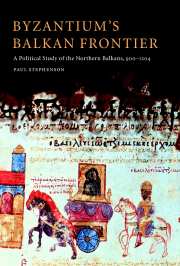Book contents
- Frontmatter
- Contents
- List of maps and figures
- Preface
- A note on citation and transliteration
- List of abbreviations
- Introduction
- 1 Bulgaria and beyond: the Northern Balkans (c.900–963)
- 2 The Byzantine occupation of Bulgaria (963–1025)
- 3 Northern nomads (1025–1100)
- 4 Southern Slavs (1025–1100)
- 5 The rise of the west, I: Normans and Crusaders (1081–1118)
- 6 The rise of the west, II: Hungarians and Venetians (1100–1143)
- 7 Manuel I Comnenus confronts the West (1143–1156)
- 8 Advancing the frontier: the annexation of Sirmium and Dalmatia (1156–1180)
- 9 Casting off the ‘Byzantine Yoke’ (1180–1204)
- Conclusions
- Bibliography
- Index
3 - Northern nomads (1025–1100)
Published online by Cambridge University Press: 25 August 2009
- Frontmatter
- Contents
- List of maps and figures
- Preface
- A note on citation and transliteration
- List of abbreviations
- Introduction
- 1 Bulgaria and beyond: the Northern Balkans (c.900–963)
- 2 The Byzantine occupation of Bulgaria (963–1025)
- 3 Northern nomads (1025–1100)
- 4 Southern Slavs (1025–1100)
- 5 The rise of the west, I: Normans and Crusaders (1081–1118)
- 6 The rise of the west, II: Hungarians and Venetians (1100–1143)
- 7 Manuel I Comnenus confronts the West (1143–1156)
- 8 Advancing the frontier: the annexation of Sirmium and Dalmatia (1156–1180)
- 9 Casting off the ‘Byzantine Yoke’ (1180–1204)
- Conclusions
- Bibliography
- Index
Summary
Basil's annexation of Bulgaria established Byzantium's Balkan frontier at the Danube. However, there are no signs that he established a civilian or financial administration at the lower Danube, nor is there proof that Basil II organized a distinct theme of Paristrion. Instead, he relied, as Tzimisces had, on military commanders in far-flung citadels. His control of Bulgaria–in all its constituent parts–rested on his ability to ensure the support of the local elites, and to operate through existing power structures. This was not essentially different to the methods of government
employed elsewhere in the expansive and ethnically diverse empire. However, in Bulgaria local and regional support was guaranteed, at least initially, by the presence of large numbers of Byzantine troops in strategic citadels and watchtowers, and the forbidding presence of a large standing army some way to the south, in Philippopolis and Adrianople. For this reason, despite the revised picture of his reign that is emerging, there is a great deal of truth in the characterization of Basil II as a ‘military’ emperor.
As we have noted in the introduction, George Ostrogorsky believed the period of Basil's military conquests marked the apogee of the medieval empire. Consequently, he considered the weakness of Basil's ‘civilian’ successors to have been instrumental in the empire's supposed ‘disintegration’ after 1025, with the denouement in 1071: the year that Bari fell to the Normans, and Romanus IV lost the infamous battle at Mantzikert.
- Type
- Chapter
- Information
- Byzantium's Balkan FrontierA Political Study of the Northern Balkans, 900–1204, pp. 80 - 116Publisher: Cambridge University PressPrint publication year: 2000



